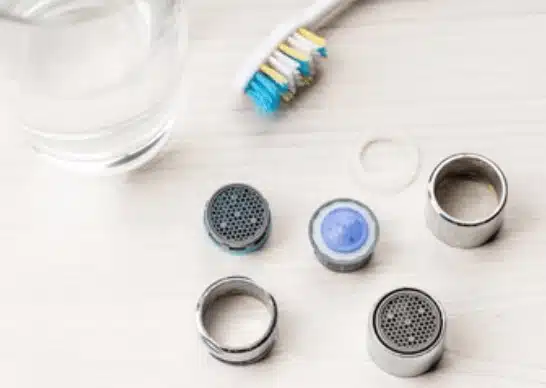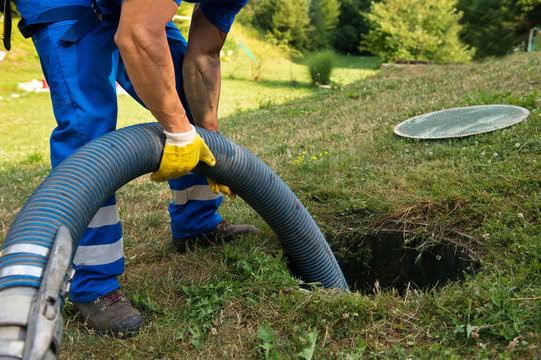Copper pipes are commonly used in plumbing systems due to their durability and resistance to corrosion.
However, over time, copper pipes can develop a buildup of green or blue tarnish, which not only detracts from their appearance but can also reduce their efficiency.
Cleaning copper pipes is essential for maintaining their functionality and prolonging their lifespan.
In this article, we will discuss various effective methods and tips on how to clean copper pipe
Here are 4 steps for you to know copper pipe cleaning:
One of the most effective and affordable ways for how to clean copper pipe is by using white vinegar.
To clean copper pipe with white vinegar, simply follow these steps:
1. Mix equal parts of white vinegar and warm water in a bowl or bucket.
2. Dip a sponge or a clean rag into the vinegar solution.
3. Gently scrub the surface of the copper pipe, focusing on areas with green or blue tarnish.
4. Rinse the pipe with water to remove any residue.
5. Dry the pipe thoroughly with a clean rag.
White vinegar is effective in removing tarnish and corrosion from copper due to its acidic properties.

If you don’t have white vinegar on hand, you can also use a mixture of lemon juice and baking soda to clean copper pipes.
Here’s how:
1. Cut a lemon in half and squeeze the juice into a bowl.
2. Add a tablespoon of baking soda to the lemon juice and mix well.
3. The mixture will start to fizz, indicating a chemical reaction.
4. Dip a soft cloth or sponge into the mixture and apply it to the tarnished areas of the copper pipe.
5. Gently scrub the pipe until the tarnish is removed.
6. Rinse the pipe with water to remove any residue.
7. Dry the pipe thoroughly with a clean rag.
Lemon juice is acidic and helps to dissolve the tarnish, while baking soda acts as an abrasive that aids in cleaning.
This method is particularly useful for stubborn tarnish or oxidation on copper pipes.
When cleaning copper pipes, it is important to avoid using abrasive cleaners or tools such as steel wool.
These can scratch the surface of the copper and cause further damage.
It is recommended to use non-abrasive materials such as sponges or soft cloths for cleaning.
Additionally, it is essential to avoid using harsh chemicals or cleaners that contain corrosive substances.
These can corrode the copper, leading to further damage and potential leaks in the pipes.
Stick to natural cleaning solutions such as vinegar or lemon juice for safe and effective cleaning.
After cleaning your copper pipes, it is important to take preventive measures to reduce future tarnish and corrosion.
Here are some tips:
1. Keep the area around the pipe clean and dry to prevent the buildup of moisture.
2. Regularly inspect and clean your pipes to identify any signs of tarnish or corrosion early on.
3. Consider using a copper polish to protect the surface of the copper and prevent tarnish.
4. If you have hard water deposits inside and outside the pipe, use distilled white vinegar instead of regular vinegar for cleaning.
By following these tips and tricks, you can effectively clean and maintain your copper pipes, ensuring their optimal performance and longevity.
In conclusion, cleaning copper pipes is essential for maintaining their functionality and preventing the buildup of tarnish and corrosion.
Using natural cleaning solutions such as white vinegar or lemon juice, along with non-abrasive materials for scrubbing, can effectively clean copper pipes without causing damage.
Regular maintenance and preventive measures can also help in prolonging the lifespan of copper pipes.
By following the tips and methods mentioned in this article, you knew exactly how to clean copper pipe.

Cleaning copper pipes inside is essential to maintain their functionality and prevent corrosion from copper oxidation and rust.
To know how to clean copper pipe, avoid using harsh chemicals that can corrode the surface of your copper.
Instead, try these safe and effective ways of how to clean copper pipe.
Make a paste with equal amounts of baking soda and distilled white vinegar.
Apply it to the tarnished areas of the pipe and let it sit for 15 minutes.
Scrub away grime with a sponge or cloth, then rinse with warm water.
Mix cream of tartar with lemon juice to form a cleaning paste.
Rub it onto the copper surface and let it sit for a while before scrubbing with a soft cloth.
Apply ketchup mixed with a tablespoon of salt to the pipe’s surface.
Let it sit for a few minutes, then scrub with a sponge or cloth.
For tough deposits, use steel wool to gently polish copper pipes. Be careful not to scratch the surface.
If your pipes have stubborn build-up inside, consult a plumber.
SharkBite sealant can be used to unclog and seal connections without soldering.
After cleaning, always rinse thoroughly and dry the pipe with a clean rag.
These tips and tricks will help your copper pipes look shiny and maintain their corrosion resistance for years to come.
At Al Rooter Plumbing Company, we understand the importance of maintaining your copper pipes, especially when using SharkBite connections.
Here’s a safe way for how to clean copper pipe for sharkbite without risking damage:
This method ensures your copper pipes remain clean and free from clogs while preserving their integrity.
Trust Al Rooter Plumbing Company for all your residential plumbing needs.
Copper pipes can corrode due to several factors:
1-Chemical Reactions:
The most common cause of copper pipe corrosion is chemical reactions between the copper, water, and other substances in the environment.
When water with a low pH (acidity) or high mineral content comes into contact with copper, it can create an electrochemical reaction that corrodes the metal.
2-Oxygen Exposure:
Oxygen in the water can also lead to corrosion, particularly when there are temperature fluctuations.
Oxygen promotes the oxidation of copper, leading to the formation of copper oxide on the pipe’s surface.
3-High-Velocity Water:
Fast-moving or turbulent water can erode the protective layer on the interior of copper pipes, making them more susceptible to corrosion.
4-Microbial Activity:
Microorganisms in water can produce byproducts that corrode copper.
This is often seen in stagnant or improperly treated water systems.
5-Electrolysis:
When different metals are connected in a plumbing system, it can create a galvanic cell that accelerates the corrosion of the less noble metal.
6-Chemical Contaminants:
Presence of certain chemicals or contaminants in the water, such as chlorides or sulfides, can initiate corrosion in copper pipes.
To prevent copper pipe corrosion, it’s essential to use appropriate water treatment methods and maintain proper pH levels.
Additionally, installing dielectric unions or using sacrificial anodes can help protect copper pipes from galvanic corrosion when they are in contact with dissimilar metals.

No, blue corrosion on copper pipes, commonly known as “blue water,” is not inherently dangerous to human health.
It is typically caused by a reaction between the copper pipes and the water’s chemistry.
However, while it may not pose direct health risks, it can have some implications:
To address blue corrosion, it’s essential to determine the cause, which could include factors such as water pH, mineral content, or the presence of aggressive chemicals.
How to clean copper pipe? Our experts can provide solutions to maintain water quality and preserve your plumbing system’s integrity.
Testing and adjusting the water chemistry, installing water treatment systems, or using corrosion-resistant plumbing materials are potential solutions.
To address blue corrosion, consult professionals who know how to clean copper pipe effectively.
Trust Al Rooter for all your plumbing needs. how to clean copper pipe? Contact us today for assistance.
Green corrosion on copper pipes, commonly referred to as verdigris, is generally not hazardous to health.
At Al Rooter Plumbing Company, we emphasize that while green discoloration is typically aesthetic, it can raise concerns about potential weakening of the pipes over time.
To address verdigris, it’s essential to understand how to clean copper pipe effectively.
Our experts can provide solutions to maintain water quality and preserve the integrity of your plumbing system.

Cleaning tarnished copper pipes is essential to maintain their appearance and prevent corrosion.
To clean tarnished copper pipes, follow these steps:
Steps:
Prepare the Lemon and Salt Mixture: Cut a lemon in half and sprinkle a generous amount of table salt on one of the lemon halves.
Scrub the Tarnished Areas: Rub the salted lemon half onto the tarnished areas of the copper pipe.
Rinse with Warm Water: After scrubbing, rinse the copper pipe thoroughly with warm water to remove any lemon and salt residue.
Dry and Polish: Use a soft cloth or sponge to dry the copper pipe thoroughly.
Alternative Methods:
Baking Soda and Water: Instead of lemon and salt, make a paste using baking soda and water.
Vinegar: Soak a clean cloth in vinegar and wrap it around the tarnished areas.
Commercial Copper Cleaner: If the tarnish is severe or these methods don’t work, consider using a commercial copper cleaner following the product’s instructions.
Regular cleaning of tarnished copper pipes will help maintain their appearance and prevent further corrosion.

Al Rooter Plumbing offers professional sewer line plumbing services.
They have a team of skilled technicians who provide top-quality repairs and replacements for sewer lines.
With their expertise, they can efficiently know how to clean copper pipes, ensuring their smooth and reliable functionality.
Al Rooter Plumbing is the go-to service provider for all your sewer line plumbing needs.
Contact Al Rooter Plumbing Company today for all your plumbing needs.
They are experts in handling a wide range of plumbing issues, including cleaning copper pipes.
If you’re unsure about how to clean copper pipe, their experienced plumbers can provide you with the necessary guidance and techniques.
Trust Al Rooter Plumbing Company to deliver efficient and reliable plumbing services.

